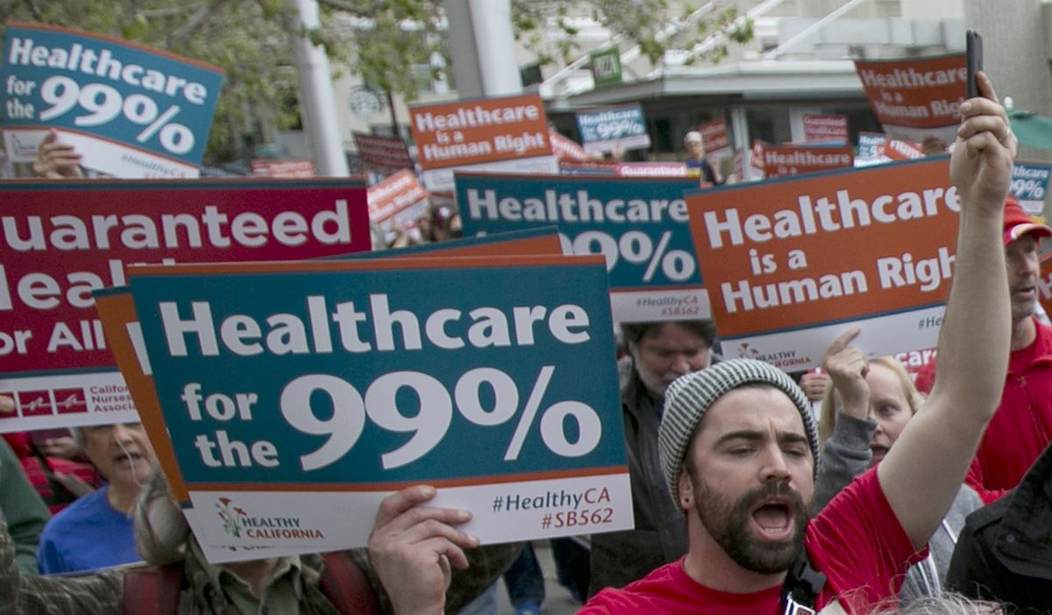Last year, nearly two-in-five working Americans skipped or delayed medical treatments because of the sheer cost of health care. In 2024, as many of America’s most vulnerable citizens delay or forgo medical treatments, some states are offering taxpayer-funded health care to the millions of illegal immigrants who have streamed across the Southern border.
Incredibly, military veterans, who put their lives on the line for their country, wait an average of 34 days to get an appointment that they should get in seven days. Meanwhile, these heroes watch undocumented, mostly military-age men from other countries receive immediate medical care without paying a premium, deductible, or copay as they receive “free” health care at California emergency rooms.
In 2024, California began to provide government-funded health care for an additional 760,000 undocumented migrants. Taxpayers from the 49 other states are right to wonder how much of that tab they are picking up.
It is unsurprising that California provides expensive and controversial medical benefits (such as “gender-affirming” surgery and unrestricted abortion services) that are often illegal in other states. But in 2024, California provided access to Medicaid-style government-funded health care regardless of one’s immigration status. Meanwhile, the Golden State currently faces a $73 billion shortfall.
California Senate Republicans warned "Medi-Cal is already strained by serving 14.6 million Californians – more than a third of the state's population. Adding 764,000 more individuals to the system will certainly exacerbate current provider access problems.” The state now provides health care for more than one million illegal aliens, including 203,000 children and 235,000 adults over 50-years-old who were previously enrolled.
States are the laboratories of democracy and should be allowed to experiment and even make expensive mistakes. But how do you allow a state to “cover the costs” of programs that are partnerships paid for with state and federal funds? That thorny problem has led some in Congress to tap the brakes on federal money going to health care for illegal aliens.
Sen. Bill Cassidy (R-LA) has introduced legislation that would prevent federal tax funds from being used by states that choose to provide comprehensive health care to illegal immigrants. Specifically, the bill:
“would provide ‘a description of States’ methods of financing State programs that provide health benefits to noncitizens who are ineligible for medical assistance due to not having a satisfactory immigration status, including through the increased use of provider taxes and intergovernmental transfers to finance the non-Federal share of expenditures under the State Medicaid program for medical assistance provided to individuals who are not so ineligible.”
In Minnesota, legislation was passed to allow undocumented immigrants to enroll in Minnesota Care, a state-based health care program that was launched in the 1990s for low-income families with children. When the state elected to expand Medicaid in 2011, the program and the “sick tax” that funded it were scheduled to expire. However, legislators resurrected the program (and the sick tax) and put more laws on the books to expand it as a “public option” first to middle-income workers and then, last year, to high-income earners and illegal immigrants starting in 2025. Unsurprisingly, 98 percent of the “premium-supported insurance” is funded by taxpayers.
The mechanism that was developed to operate Minnesota Care is called the Healthcare Access Fund (HCAF). It is subsidized by Federal Basic Healthcare Plan (BHP) funds, some intergovernmental transfers, a 1.8 percent tax on all health care services and devices, as well as a one percent gross premium tax. The fund is completely separate from the state’s general fund, but according to state fiscal analysts, “The portion of MinnesotaCare funded by the HCAF reflects the cost of the program not covered by federal BHP revenue or enrollee-paid premiums.”
Beyond the complexity of trying to segregate nonstate funds within the complicated state/federal/intrastate funding mechanisms, money from all 50 states is taxed through the Minnesota sick tax every day when a patient is seen, a medical device is shipped, or any one of 38,000 slides from around the world is read at the Mayo Clinic in Rochester. If legislators like Cassidy don’t want Louisianians to pay for health care for Minnesota’s illegal immigrants, it may be harder than he thinks.
In December of 2023, there were 250,000 migrant encounters at the U.S.-Mexico border, the highest on record. This stress is testing the limits of border patrol, police, and social services across the country. As states care for vulnerable citizens and veterans with scarce resources, they should not have to subsidize states that just make things worse by inviting more illegal immigrants with the false promise of “free” health care.
Matt Dean ([email protected]) is a senior fellow for health care policy outreach with The Heartland Institute.













Join the conversation as a VIP Member